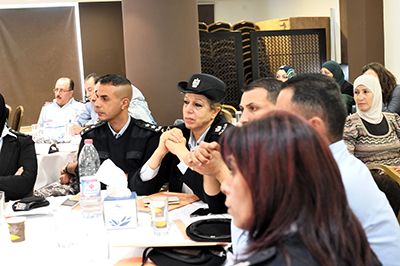Promoting Equality and Diversity to Better Serve Palestinians
PCP kick-starts the development of its first gender strategyDate:
When Colonel Wafa Muammar entered the police force in 1996, she was part of the first generation of Palestinian police officers. Almost 20 years later, while the former police officer Wafa has now become the head of the Family and Juvenile Protection Unit, and the first and only women with a rank of Colonel in the Palestinian Civil Police (PCP), she is still one of the few Palestinian policewomen.

How to attract and retain women was at the centre of the discussions of the workshop for the development of the PCP gender strategy. In cooperation with UN Women, the PCP convened from 3rd to 5th November, 35 representatives of the different departments of the PCP, as well as strategic partners, to look at objectives and strategies to guide the PCP and its Gender Unit in leading a systematic integration of gender in its processes.
Looking at organizational barriers that continue to maintain women out of the police force revealed for the participants how internal gender dynamics were at stake at different levels. “There is clearly a discrimination in terms of social benefits for the security force personnel” reminded one officer, referring to the entitlement of relatives of policemen to health insurance or retirement allocation, contrary to policewomen. A legal paper with clear recommendations to address these gaps was recently developed and submitted to the legal advisor at the President office.
Representation of women in the police force goes far beyond a question of parity. Credibility and legitimacy of the police, and therefore its performance, depends heavily in its ability to effectively recognize and address the needs of all citizens, and therefore its ability to integrate and use the diversity of skills, experience, education and culture to provide solutions to the variety of security’s needs.
Women are needed and crucial to improve the police's performance and services, and the trust and confidence of the public in the police. As revealed in a recent survey,[2] a significant number of women would prefer dealing with a woman police officer, even if generally the public considers both sexes equally competent. The most obvious remains in cases related to violence, with women admitting being more at ease talking with a policewoman.
A first step in better integrating gender concerns in the PCP structure and overall work, the gender strategy will clearly contribute to the different efforts already engaged by the Palestinian Civil Police in strengthening the capacity and role of the Gender Unit – the first one in the Arab world – and in better responding to the security needs of women and children. Supported by UN Women, under the Sawasya Joint Programme (UNDP/UN Women), the work on the PCP gender strategy falls within the larger partnership of UN Women and the PCP initiated to support to the Family and Juvenile Protection Unit in the establishment of safe reporting spaces for women and children victims of violence.
[1] Women represent about 3.75% of the PCP force, compared to a global average of 9% women representation in the police.
[2] UNDP, EUPOL COPPS, Public Perception Survey of the Performance of the Palestinian Police, May 2015